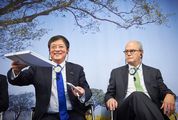IT IS great that the Congress of South African Trade Unions (Cosatu) is getting some help. A little family counselling cannot possibly do any harm.
Or can it?
Cosatu is in dire need of it, despite its president, Sdumo Dlamini, shifting some of the blame for the deep crisis in the federation to the imagination of journalists. The African National Congress’s (ANC’s) intervention must be a welcome reprieve, as Cosatu has for months now been oscillating between paralysis and stumbling back from the brink of a split.
After the tumult in its ranks over the past two years, some good, solid therapy may be just what the federation needs. At the rate they have been going at each other over the past 18 months, many members will need some serious couch time with the therapist, the ANC, to rid themselves of the memories and the bruises inflicted by both sides in the factional battle that unfolded around general secretary Zwelinzima Vavi.
But whether the ANC is the most appropriate to resolve the issues in Cosatu is a critical question. Can the ANC be an honest broker of a truce in a battle in which it had a hand to begin with? Is it able to navigate the complex battle in Cosatu in which it is now both an arbiter and a player? Its ability to do this will depend largely on its motives for intervening in the battle.
It was Vavi’s critical stance against Cosatu’s allies, the ANC and the South African Communist Party (SACP), that led to the "rupture" between him and the organisation, identified by affiliate leaders, former close friends, who turned so spectacularly against him. It was also his refusal to take up a position on the ANC’s national executive committee — which President Jacob Zuma had encouraged unionists to do — that contributed to the "rupture".
There is also that pesky "intelligence report", which paints Vavi, and to a lesser extent National Union of Metalworkers of South Africa (Numsa) general secretary Irvin Jim, as "agents of imperialism", working with western forces to destabilise the ANC. This report was circulated by Dlamini, says Vavi, to discredit him ahead of the meeting at which he was suspended last year. Then there is the matter of the nine charges Vavi is set to face next month. The manner in which those charges will be handled by Cosatu — and the ANC, from this point on — will provide an indication of whether those charges are genuine or trumped up by Vavi’s enemies to get rid of him.
Are those charges opportunistic? If the ANC, in its intervention, is able to provide a "political solution" to the disciplinary process against him, the faction opposing Vavi — and aligned to the ANC — would have egg on its face.
On the other hand, facing the charges and whatever sanction follows will provoke Vavi’s allies in the federation, including Numsa and eight other unions, into action, returning the federation to its pre-intervention state.
Then there is Numsa, which took a decision to call on Cosatu to break away from the alliance with the ANC. The decision was taken with the mandate of Numsa’s members. For months before the congress it held policy workshops and meetings across its structures to arrive at those decisions. Numsa is to return to its national executive committee for a mandate on the ANC intervention. It is unlikely to take a decision against it as it has said it is committed to forging unity in Cosatu.
But Numsa had been described as the "enemy within" by Cosatu affiliates opposing it. SACP general secretary Blade Nzimande says that while unity is paramount, it should not be "mechanical", those deliberately "hell-bent" on dividing Cosatu should be "defeated", and workers should not be distracted by a "personality cult" — a veiled reference to Vavi and the leadership of Numsa.
The perceptions around Numsa’s leaders and Vavi, who have been lambasted by alliance leaders from the ANC as "hypocritical" and "speaking with forked tongues", and the SACP, which has accused the union leadership of being corrupt, will pose a challenge for any intervention.
Dlamini’s address at a Gauteng shop stewards council this week shows that the intervention may just be a papering over of the cracks until after the election — and an attempt to weed out the "enemy within" with minimal damage.
"Those who never stood for unity of workers and unity of the federation shall be exposed by this programme (the intervention)," he said.
What will also be exposed is the motive behind the ANC intervention; whether it is in the interests of the federation itself or a particular faction in Cosatu or, possibly, a particular faction in the ANC.
• Marrian is political editor.




















Data supplied by Profile Data
Change: -1.43%
Change: -0.47%
Change: -0.99%
Change: 0.00%
Change: -0.49%
Data supplied by Profile Data
Change: 1.33%
Change: 1.25%
Change: 1.05%
Change: 1.18%
Change: 1.05%
Data supplied by Profile Data
Change: 0.07%
Change: -0.21%
Change: 0.59%
Change: -1.03%
Change: -2.59%
Data supplied by Profile Data